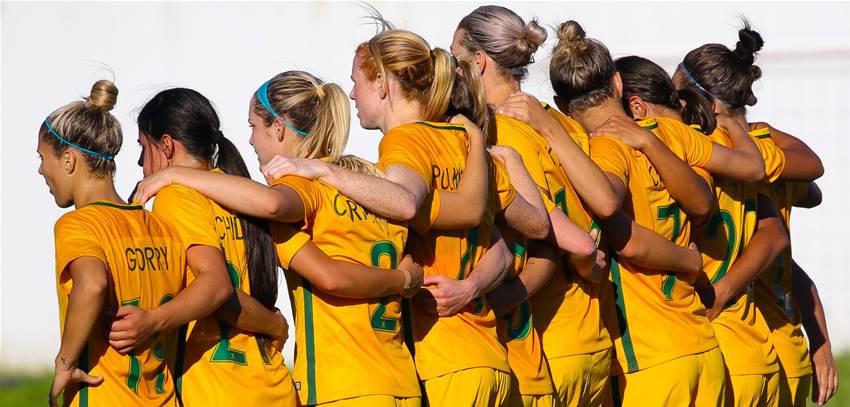18 points.
18 points.
In the September's FIFA Women's World Rankings that is all that separates the current number 6 Australia from the number 3 ranked England.
The margin is so small yet but it is telling.
In the 10 months since the 2016 Rio Olympic Games, and prior to the European Championships, England played a total of 14 internationals and Australia just 4. Since the 2017 EUROs that discrepancy is now 19 and 7.
When you look around at the nations above Australia it is noticeable the number of matches played by those nations: USA (16), Germany (14), England (19), France (15), Canada (9).
Granted the numbers of the European nations are inflated due to the EUROs but even the nation with the lowest number of matches, Canada, has played more internationals than Australia.
And for Australia the gaps between matches are significant.
Prior to the Algarve Cup there was a 7 month break between internationals and a 4 month break from the Algarve Cup to Tournament of Nations. Even after the September Brazil series, there will be probably be a close to 6 month break between internationals to the Algarve Cup or Cyprus Cup (depending on which they are invited to) or even longer to the Asian Cup in April 2018.
Put simply, the Matildas need to play more internationals.
This is for many reasons. Firstly, the regular rhythm of internationals could assist in building the consistency of the team that Alen Stajcic and the players have constantly been speaking about.
Here is a table of the number of matches a nation played in the 12 months prior to winning their championship.
| Nation | Matches Played | Title |
| Netherlands | 17 | 2017 European Championships |
| Germany | 11 | 2016 Rio Olympics |
| USA | 22 | 2015 World Cup |
| Japan | 15 | 2014 Asian Cup |
| USA | 15 | 2012 London Olympics |
| Japan | 10 | 2011 World Cup |
Winning is a habit and a team needs to build processes around that. Performing those processes regularly becomes ingrained in the team culture. That is much harder to accomplish if a team is meeting once every four or six months.
In the lessons learned from the Tournament of Nations, I spoke about the slow starts of Australian teams. It is arguable that regular matches would assist in that. At the very least, it couldn't hurt.
Secondly, regular matches would assist the Matildas in moving up the world rankings. I know, I know, I hear you groan that its world rankings. However, it's easy to dismiss rankings and say that they don't matter – and certainly there is a semblance of truth to that – but when it comes to World Cup seeding, rankings absolutely matter.
Being seeded at a tournament provides a nation with some semblance of protection. The difference between being a 7th or 8th and unseeded is not insubstantial at a tournament. It's the difference in getting a group that contains Cameroon, Ecuador and Switzerland – like the AFC seeded Japan at the 2015 WWC – and a group that contains the USA, Nigeria and Sweden.
Thirdly, it is about providing the team with the best possible preparation in a critical period of their history.
If the Matildas are to claim medals at the next three major tournaments – 2018 Asian Cup, 2019 World Cup and 2020 Tokyo Olympics – then Football Federation Australia needs to go all in.
To be fair to the FFA, there have already been noticeable improvements and gains in relation to increased support staff, recovery and off-field support.
Since the announcement of this September's Brazil series, players have been present in the media, FFA have flooded social media with continual promotion of the matches and the Matildas with strong written and visual content. In essence, FFA approached the series as they would a Socceroos match. That is all supporters have been asking for; equal treatment.
In return they have been rewarded with a sold out match that also demonstrates the support and good will the Matildas have garnered – particularly in the past decade.
Going all in should mean – at the very least – the Matildas are playing matches during every FIFA international window.
The situation in the Matildas scheduling is certainly complex. There are always the budgetary concerns and balancing the senior team needs with those of the younger representative teams – noting that the Junior Matildas did not play an international before departing for the AFC U17 Championships.
However this is a national team that has continually broke new ground for Australian football and, if supported well, could continue to do so.
Increased resourcing, more matches, has fueled the rise of many women's football nations in the past decade – Japan, France, England, Netherlands – and it could do the same for Matildas.
Related Articles

Aussies Abroad: Dub champions gutted, ribbons Raso on the move, and transfers, transfers, transfers

AIG Women’s Open third round pairings & tee times (AEST)













